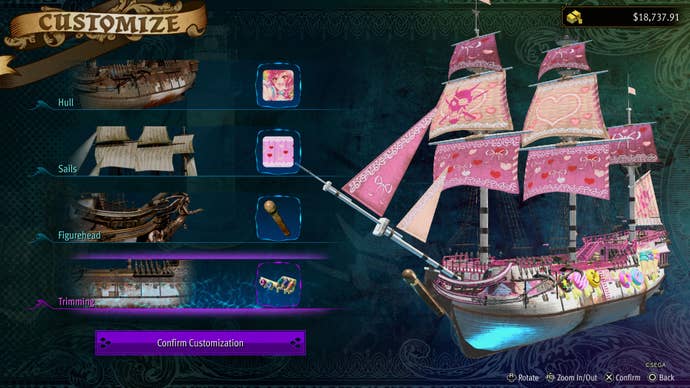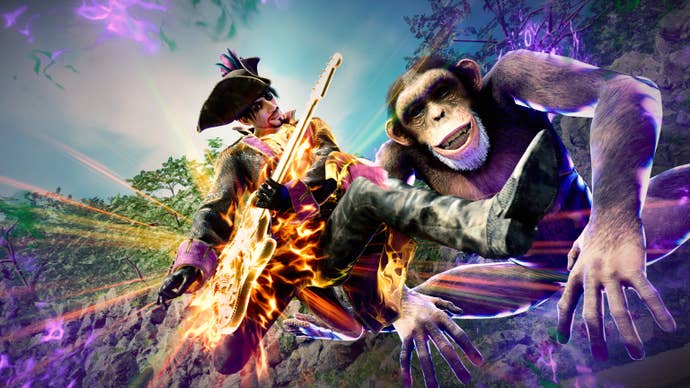12 copies of the same photo book have just been sold to the same loveable idiot. Thankfully, he’s got a pirate ship to store them on.
It’s crewed by a mishmash of weirdos from all walks of life, who’ll actually become better at the whole swashbuckling thing if they’re gifted one of these tomes. But that’ll have to wait.
Goro Majima and a woman he’s trying to invite to a party – which at one point will revolve around a middle-aged man showering while gripping a dandelion between his teeth – step off the boat onto a remote island. As they chill out on the beach, tells her he’s helping a kid live the dream – an adventure on the high seas that’d shiver anyone’s timbers.
Things get quite touching for a moment. Then, a gang of pirates attack. Majima goes to whip them into shape by chucking his trusty boomerang cutlasses, and he’s got backup he doesn’t expect. She’s pulled a full-size sniper rifle out of thin air, and is blasting away in a fashion that’d make Danny DeVito proud. Naturally, he’ll later recruit her into his seafaring Kiryu Clan as a laser cannoneer.
Like a Dragon: Pirate Yakuza in Hawaii does this kind of thing often. It’s a Yakuza game, a pirate game, a pirate Yakuza game, and a Yakuza pirate game. It switches between these identities more smoothly than Goro Majima switches outfits in the pink phone box-sized changing rooms at his various hangouts. It revels in the inherent ridiculousness of this duality, and yet if you let yourself be brought along for the ride, you’ll still find it has a solid smattering of more serious and characterful moments.
There were a few points in its main story – which sees the iconic series’ charismatic mad dog washed up with amnesia on the shores of an island off the coast of Hawaii, and evolves into a hunt for a hidden treasure horde with all the scheming intrigue that you get whenever things go pear-shaped for the Tojo Clan – when I found myself wondering if Pirate Yakuza truly felt like a Majima story. If you were to plug Like A Dragon namesake Kazuma Kiryu in there, would things play out all that differently? There’s certainly some crossover – they’re both tough, ageing yakuza blokes whose carefully cultivated underworld mannerisms give way to an inner warmth.
But this is a Majima story – not just because it takes the series’ weirdness knob and cranks it up to maximum when it makes sense to do so – but because it conveys a different viewpoint on life to any of Kiryu’s adventures, especially the gritty Like A Dragon Gaiden: The Man Who Erased His Name. What at first you can easily mistake for carefree, childlike lust for life that might border on a nihilistic ducking of responsibility, as Majima seems to dismiss all that he’s forgotten in his desire to keep the rush of rampaging adventure flowing, rounds out into something more than that. Sure, both Kiryu and Majima have lost their sense of identity at the start of these refreshingly short tales – there’s a shared alienation, a sense of having to reconnect with the world – but it comes in unique forms.
Kiryu’s fighting not to drown in the real, and to find something worth believing in that’ll power him onwards in his new life. Majima’s having to mature and drag himself away from the allure of living a fantasy, while not losing his wild horse soul.
That fantasy’s encapsulated by the pirate lifestyle he merrily stumbles into, and begins to get lost in the trappings of. As a pirate game, Pirate Yakuza in Hawaii is the most fun I’ve had single-player swashbuckling since Assassin’s Creed Black Flag – and I don’t just say that because the former’s sailing and ship combat feels like it’s deliberately drawn plenty of inspiration from what Ubisoft executed so well.
The controls, the feel of manoeuvring your vessel to deliver another broadside blast, the picking away from afar with side-weapons. It’s all in there, and it’s like slipping back into a nice, warm rum bath. There’s not as much of as focus on ramming to dish out big damage – something I feel like Black Flag totally nailed – but you can have plenty of fun with the array of gatling guns, RPGs, and elemental armaments Pirate Yakuza uses to take things to a ridiculous and very Like A Dragon level. Your ship also has the ability to boost and drift about, like a big dragon kart with sails, because of course it does.

That said, it did feel like a lot of the early-to-mid-game ship battle difficulty curve was negated by the fact I could craft some laser cannons pretty quickly – with their short, sustained bursts doing a hefty chunk of damage compared to the blasts of more regular cannons, and the recharge time not feeling like it offered too much of a penalty to counteract the added firepower. It’s only once I started running into the real cream of the crop at the Pirates’ Coliseum – the battle arena that’s the centrepiece of Pirate Yakuza’s main new addition to the setting of established Infinite Wealth locations Honolulu and Nele Island – that I felt in any danger of being sunk.
RGG’s no stranger to a good battle arena, and the coliseum feels like one of its best. Not just a place to grind up your crew’s levels and cash to upgrade or customise your ship, but as the place you come to harden yourself ahead of a key main story battle or a dungeon run of treasure islands often guarded by the tough Devil Flags – a notoriously rowdy pirate armada you’re tasked with dismantling as one the game’s main sub-plots.
Meanwhile, when you’re on land, you’ll be rampaging about on foot in the more typical Like A Dragon style. Majima’s two fighting styles – a mad dog stance that’d definitely give early Yakuza series Kiryu PTSD and a sea dog stance that’s, as you’ve probably guessed, piratey – are both very satisfying, if perhaps a bit overpowered when it comes to their top line heat and madness abilities, especially when coupled with Majima’s ability to rapidly move and jump around in a way that his enemies just can’t. It’s much more noticeable early on, especially if you’re on the standard difficulty, with the likes of the mad dog Majima cloning ability you can activate when you fill up the wonderfully-named madness gauge in that style being able to summon multiple clones that can easily knock full bars of health off of boss enemies while you just chill.
The sea dog style ultimate abilities of playing brilliantly weird cursed instruments that summon spectral animals are similarly powerful, and can also feel like a cheat code if you’re not facing a huge horde of enemies or someone especially tough. That said, especially in the likes of pirate crew deck brawls and treasure island runs, you’ll be unable to pause and down some trusty Staminan, which does help make things feel better balanced. Sometimes you do actually need a huge ghost monkey summoned by strumming a riff, you know?

The on-foot sections of the game do a commendable job of not feeling as out of whack with the sailing as they easily could have. While some of the Honolulu activities which have just been pulled over from Infinite Wealth, like the photo rallies and yelling hello at people in the street to fill up your Aloha Links friend list, don’t fit nearly as well here as they did with that game’s wonderfully cheesy summer holiday vibe, they’re largely the exception.
RGG’s also embraced visual customisation in a more in-depth manner than it ever has before here – not just with your ship, but with putting together custom outfits for Majima that’re mix-and-matchable, rather than rigidly set. You’ll spend most of your time in your getup of choice, ticking off suitably piratey sub-stories and goals in order to recruit new crewmates, as well as hunting down bounty targets pulled from IW’s array of different enemy categories to beef up your bank balance in refreshingly ungrindy chunks.
That said, there was one side bit of the game that didn’t feel like it belonged. It’s the ending to the pretty major and otherwise perfectly pirate Yakuza Minato Girls sub-story (which I kicked this review off by describing an encounter from). Suddenly, the game cuts away to a bunch of live-action filmed skits with the voice actor of Majima’s crewmate Masato awkwardly failing to seduce the five ladies you’ve gotten to come to his party. I could get the jokes Japanese comedian Ryûji Akiyama was trying to tell, but the sudden change in format took me out of it, and the punchlines didn’t land as well as they might have if I’d – for example – been watching a guy crack wise about having “love juice” put in his hair via a classic Yakuza animated cutscene or bit of dialogue.
Aside from that, though, you might not be blown away by any of its individual pieces in terms of seeing them as steps forward for the series or the gaming industry, as can probably be expected from a spin-off, but to borrow a quote from a certain short guy, it all just works. You can see exactly what the devs are going for with each choice and mechanic, why they’ve done it, and have as much loveably idiotic pirate Yakuza fun as you’d want to.
Like A Dragon: Pirate Yakuza in Hawaii releases on February 21, 2025 for PS5, PS4, Xbox Series X/S, Xbox One, and PC via Steam. This review was conducted on PS5 using a code provided by the publisher.









